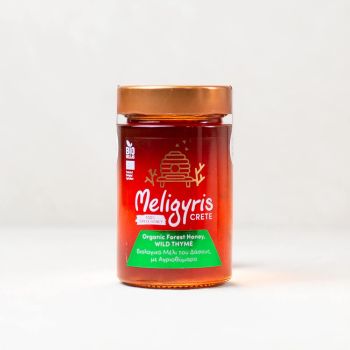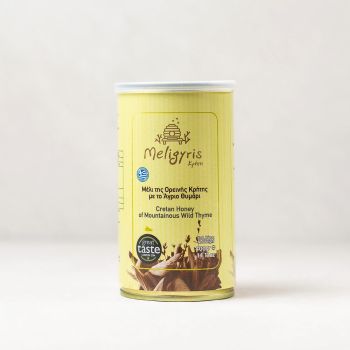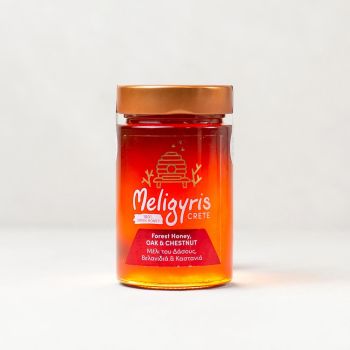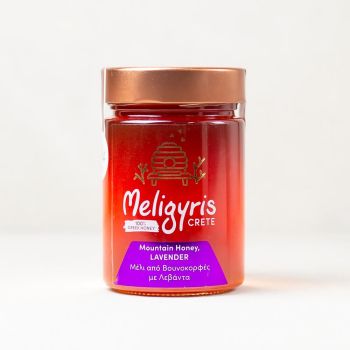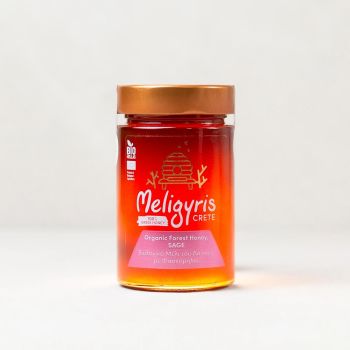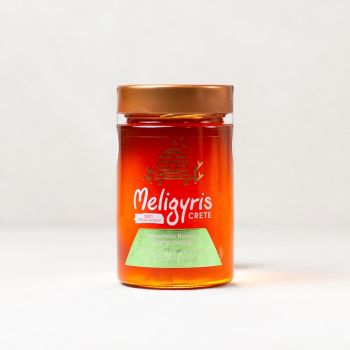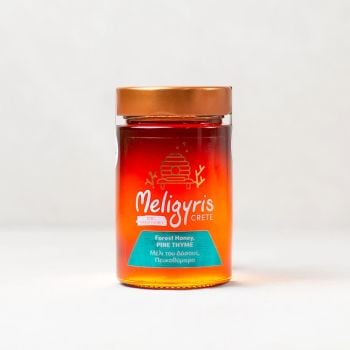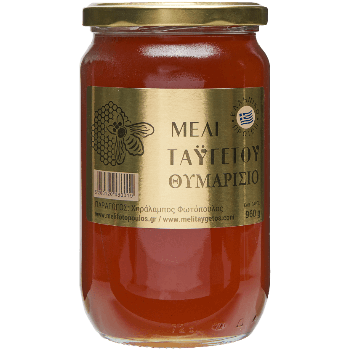We use cookies to make your experience better. To comply with the new e-Privacy directive, we need to ask for your consent to set the cookies. Learn more.
Our range of honey includes over ten different varieties, from classics like Thyme and Pine to more unusual flavours such as Sage, Lavender, and Orange Blossom. These flavours are not added or infused but reflect the plants the bees fed on when producing the honey. The flavour, colour, and aromas result from the nectar of the plants in flower. As different plants flower at various times of the year and locations, beekeepers can produce a range of flavours over the course of the year.
Both our organically-certified and conventional honeys follow the same rules of placing the hives at least 3 km from contamination sources, which includes agriculture, industry, and human settlements. Except for the orange and lemon blossom honey, all other honeys are produced by bees that forage solely from wild plants. This not only guarantees safety but also enhances the quality of the honey, as wild plants produce smaller amounts of nectar, rich in flavour and nutrients. Our producers use natural materials for the hives and natural remedies for pests.
Our honey producers never feed the bees sugar and ensure that the honey is free from contamination or adulteration from sugar syrup, synthetic honey, or cheap imported honey as is the case with so much of the honey found on supermarket shelves. This is done by having complete traceability to each hive as they work with beekeepers on an exclusive basis as well as rigorously lab testing every single batch of honey harvested.
This ensures our honey is 100% Greek and of the highest quality. Our honey is also free from antibiotics, chemicals, and additives. Honeybees face pressures from habitat loss, pesticides, and pests like the varroa mite, which can lead to weakened hives. To protect the bees, our producers place hives in remote wilderness areas, avoiding contamination. Natural remedies are used to control pests, and the entire production process—from hive maintenance to packaging—is done without chemicals or additives.
Though "raw honey" lacks an official definition in the EU, it generally refers to honey that hasn’t been overheated or finely filtered. Industrial honey is often pasteurised and filtered to extend shelf life, but these processes destroy many of the honey’s nutrients. Our producers do not filter or pasteurise their honey. Instead, it is left to settle, allowing impurities to rise to the top naturally. While honey may be gently heated to prevent crystallisation, it is never heated above 40°C to preserve its nutritional value.
Crystallisation is a natural process and a sign of high-quality honey that contains a lot of pollen. It is more likely to happen in colder temperatures, so honey should be stored at room temperature. If you prefer liquid honey, it can be gently heated in warm water to restore its smooth texture, though crystallised honey is perfectly fine to eat as it is.
As for which honey is best, it largely depends on personal taste and the medicinal properties that may be of interest. Sage, Mountain Tea, Thyme, and Strawberry Tree honeys are known for their health benefits, while Orange & Lemon Blossom and Lavender honeys are particularly aromatic. For something more intense, Oak & Chestnut honey offers a darker, richer flavour.
Both our organically-certified and conventional honeys follow the same rules of placing the hives at least 3 km from contamination sources, which includes agriculture, industry, and human settlements. Except for the orange and lemon blossom honey, all other honeys are produced by bees that forage solely from wild plants. This not only guarantees safety but also enhances the quality of the honey, as wild plants produce smaller amounts of nectar, rich in flavour and nutrients. Our producers use natural materials for the hives and natural remedies for pests.
Our honey producers never feed the bees sugar and ensure that the honey is free from contamination or adulteration from sugar syrup, synthetic honey, or cheap imported honey as is the case with so much of the honey found on supermarket shelves. This is done by having complete traceability to each hive as they work with beekeepers on an exclusive basis as well as rigorously lab testing every single batch of honey harvested.
This ensures our honey is 100% Greek and of the highest quality. Our honey is also free from antibiotics, chemicals, and additives. Honeybees face pressures from habitat loss, pesticides, and pests like the varroa mite, which can lead to weakened hives. To protect the bees, our producers place hives in remote wilderness areas, avoiding contamination. Natural remedies are used to control pests, and the entire production process—from hive maintenance to packaging—is done without chemicals or additives.
Though "raw honey" lacks an official definition in the EU, it generally refers to honey that hasn’t been overheated or finely filtered. Industrial honey is often pasteurised and filtered to extend shelf life, but these processes destroy many of the honey’s nutrients. Our producers do not filter or pasteurise their honey. Instead, it is left to settle, allowing impurities to rise to the top naturally. While honey may be gently heated to prevent crystallisation, it is never heated above 40°C to preserve its nutritional value.
Crystallisation is a natural process and a sign of high-quality honey that contains a lot of pollen. It is more likely to happen in colder temperatures, so honey should be stored at room temperature. If you prefer liquid honey, it can be gently heated in warm water to restore its smooth texture, though crystallised honey is perfectly fine to eat as it is.
As for which honey is best, it largely depends on personal taste and the medicinal properties that may be of interest. Sage, Mountain Tea, Thyme, and Strawberry Tree honeys are known for their health benefits, while Orange & Lemon Blossom and Lavender honeys are particularly aromatic. For something more intense, Oak & Chestnut honey offers a darker, richer flavour.
-
 Meligyris Wild Thyme Honey 500g squeezie bottle£11.50Unit Price £2.30 / 100 g
Meligyris Wild Thyme Honey 500g squeezie bottle£11.50Unit Price £2.30 / 100 g -
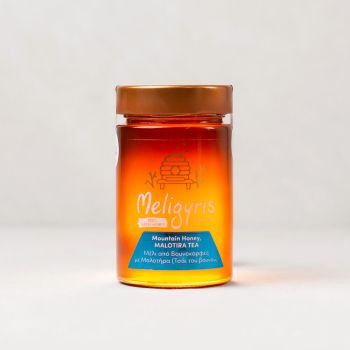 Meligyris Mountain Tea (Malotira) Honey 270g£5.95Unit Price £2.20 / 100 g
Meligyris Mountain Tea (Malotira) Honey 270g£5.95Unit Price £2.20 / 100 g -
 Meligyris Cretan Honey with Honeycomb 450g£10.50Unit Price £2.33 / 100 g
Meligyris Cretan Honey with Honeycomb 450g£10.50Unit Price £2.33 / 100 g -
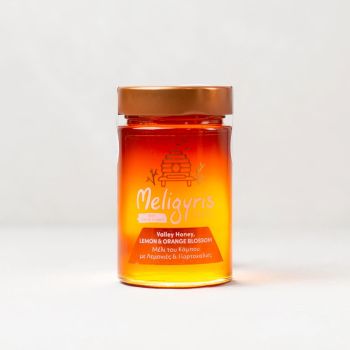 Meligyris Lemon & Orange Blossom Honey 270g£5.95Unit Price £2.20 / 100 g
Meligyris Lemon & Orange Blossom Honey 270g£5.95Unit Price £2.20 / 100 g -
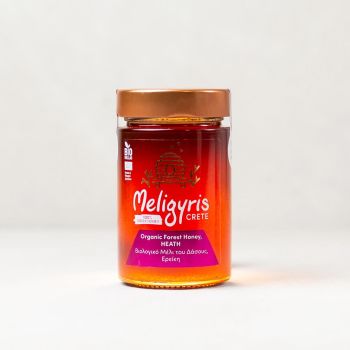 Meligyris Organic Woodland Heath Honey 270g£6.50Unit Price £2.41 / 100 g
Meligyris Organic Woodland Heath Honey 270g£6.50Unit Price £2.41 / 100 g

